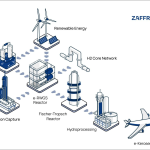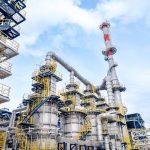Low-cost airline Norwegian has partnered with renewable energy company Norsk e-Fuel to build the world’s first full-scale production plant for zero-emission, electricity-based fuel (e-fuel). Norsk will construct the power-to-liquid (PtL) facility at Mosjøen, in northern Norway, and is targeting production of sustainable aviation fuel as early as 2026. E-fuel is created by combining captured carbon dioxide with green hydrogen using sustainably-generated power. Norwegian is targeting a 45% reduction in its flight emissions by 2030, when it expects to source around 20% of its SAF supplies from Norsk. The collaboration includes a NOK 50 million ($4.7m) purchase by Norwegian of a minority stake in Norsk, extending the growing global trend for airlines to invest in SAF production to help secure their own supplies. Their partnership also builds upon existing programmes to decarbonise Norway’s air transport sector, including electrification of all domestic flights by 2040.
Norwegian operates a fleet of almost 80 Boeing 737-800 and new, more fuel-efficient B737 MAX 8 twinjets throughout Europe, with 50 more of the new type to be delivered between 2025 and 2028, in parallel with the airline’s growing use of SAF, including the e-fuel from Norsk. The airline also has options to acquire another 30 737 MAX 8 jets between 2028 and 2030.
In addition to the partnership with Norsk e-Fuel, the airline’s CEO, Geir Karlsen, flagged the prospect of more industrial partnerships to progress the company’s sustainability ambitions.
“Our sector contributes to great value creation, both socially and economically, and we commit to significantly reducing our climate impact as we take advantage of technological advances within aviation fuel,” he said. “E-fuels can become a game changer for aviation. The partnership with Norsk e-Fuel is a landmark agreement for Norwegian, but also a milestone for aviation in Norway.
“We are actively supporting the Norwegian processing industry and contributing to local economic growth, whilst at the same time taking a major leap towards making sustainable air travel a reality. To us, this marks the beginning of a new era, and we will consider entering into several future partnerships to achieve our climate goals.”
But, he warned: “Sustainable aviation fuel needs to become both more available and less expensive. To make this a reality, the aviation industry depends on collaborating with public authorities to close the price gap between fossil fuels and e-fuels. Ultimately, e-fuels will be able to compete with and replace fossil fuels. Time is crucial, and we are very eager to get started.”
Backed by five strategic investors and other partners, Norsk e-Fuel is committed to industrialising PtL fuel production, and plans to develop multiple large-scale sites to produce synthetic fuels for aviation.
Mosjøen, the Norwegian town chosen as the site for Norsk’s first e-fuel plant, has stable access to renewable energy from hydropower, providing some of Europe’s most affordable electricity. The town also has port and rail infrastructure supporting the transportation of fuel.
Lars Bjørn Larsen, CCO of Norsk e-Fuel, described the partnership with Norwegian as industry-leading in the transition to sustainable aviation. “This is quite unique,” he said. “We are looking forward to many more joining us on the journey.”
Following a strategy of “take what we have and turn it into what we need”, the company said it would use 100% renewable energy, water and CO2, both recycled or directly captured from the atmosphere, to create sustainable fuels.
“As project developer, Norsk e-Fuel is establishing large-scale production sites to deliver synthetic fuels to the aviation industry. The company is determined to develop a new value chain for sustainable fuels, starting with the Mosjøen production facility,” reported the company.
The final product reduces greenhouse gas emission by 99% compared to fossil fuels, claims the company, a figure calculated according to the EU ETS InnovFund grant scheme and audited by risk management group DNV.
In addition to the e-fuel plan, Norway is targeting the transition of all short-haul domestic flights to electric propulsion by 2040 as part of a national commitment to achieve net zero carbon emissions by 2050. With a mountainous mainland and numerous offshore islands, the country relies heavily on short-range flights, some as short as 15-to-30 minutes.
The state-owned airport administrator, Avinor, which manages 43 airports, is working with government and industry partners to develop a programme to enable the introduction of electric aircraft. The projects include evaluation of incentives to help progress the implementation of electric-powered flights and assessments of potential side-effects including environmental impact, and any effects on competition in Norway’s aviation sector.
Among the industry partners is regional airline Widerøe, which has urged the Norwegian government to establish a ‘CO2 fund’ to promote the use of biofuels and development of infrastructure for zero-emissions air transport. The airlines also urged the government to support the transition to zero-emission flights through measures including airfare tax exemptions for flights on zero-emission aircraft, lower aviation taxes for electric aircraft, facilitation of charging infrastructure at Norwegian airports and mandatory use of electric aircraft on subsidised public service obligation routes.
Photo: Norwegian












More News & Features
Concrete Chemicals consortium secures €350m public funding for German eSAF project
Swiss advanced SAF technology startups Metafuels and Synhelion reach project milestones
PtX fuels have significant Asia-Pacific potential but face many barriers, finds report
EU states to mobilise 500 million euro support for early-mover eSAF production startups
European Commission announces Sustainable Transport Investment Plan to advance low-and-no-carbon fuels
SkyNRG says e-SAF and carbon removals should not be competing strategies for aviation decarbonisation